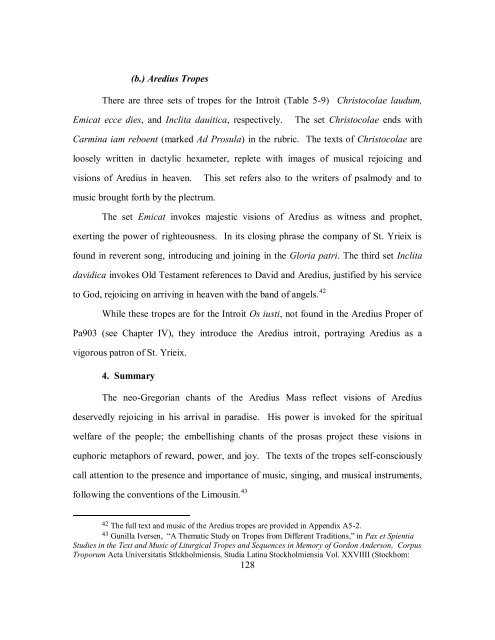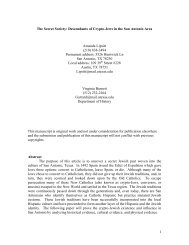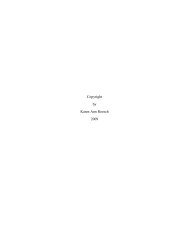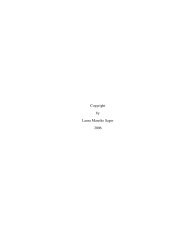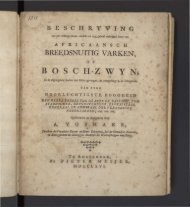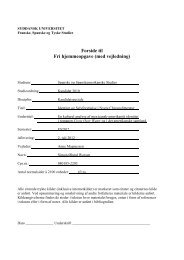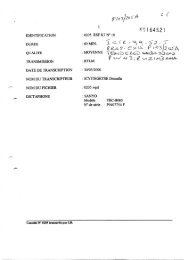Front Matter Template - The University of Texas at Austin
Front Matter Template - The University of Texas at Austin
Front Matter Template - The University of Texas at Austin
You also want an ePaper? Increase the reach of your titles
YUMPU automatically turns print PDFs into web optimized ePapers that Google loves.
(b.) Aredius Tropes<br />
<strong>The</strong>re are three sets <strong>of</strong> tropes for the Introit (Table 5-9) Christocolae laudum,<br />
Emic<strong>at</strong> ecce dies, and Inclita dauitica, respectively. <strong>The</strong> set Christocolae ends with<br />
Carmina iam reboent (marked Ad Prosula) in the rubric. <strong>The</strong> texts <strong>of</strong> Christocolae are<br />
loosely written in dactylic hexameter, replete with images <strong>of</strong> musical rejoicing and<br />
visions <strong>of</strong> Aredius in heaven. This set refers also to the writers <strong>of</strong> psalmody and to<br />
music brought forth by the plectrum.<br />
<strong>The</strong> set Emic<strong>at</strong> invokes majestic visions <strong>of</strong> Aredius as witness and prophet,<br />
exerting the power <strong>of</strong> righteousness. In its closing phrase the company <strong>of</strong> St. Yrieix is<br />
found in reverent song, introducing and joining in the Gloria p<strong>at</strong>ri. <strong>The</strong> third set Inclita<br />
davidica invokes Old Testament references to David and Aredius, justified by his service<br />
to God, rejoicing on arriving in heaven with the band <strong>of</strong> angels. 42<br />
While these tropes are for the Introit Os iusti, not found in the Aredius Proper <strong>of</strong><br />
Pa903 (see Chapter IV), they introduce the Aredius introit, portraying Aredius as a<br />
vigorous p<strong>at</strong>ron <strong>of</strong> St. Yrieix.<br />
4. Summary<br />
<strong>The</strong> neo-Gregorian chants <strong>of</strong> the Aredius Mass reflect visions <strong>of</strong> Aredius<br />
deservedly rejoicing in his arrival in paradise. His power is invoked for the spiritual<br />
welfare <strong>of</strong> the people; the embellishing chants <strong>of</strong> the prosas project these visions in<br />
euphoric metaphors <strong>of</strong> reward, power, and joy. <strong>The</strong> texts <strong>of</strong> the tropes self-consciously<br />
call <strong>at</strong>tention to the presence and importance <strong>of</strong> music, singing, and musical instruments,<br />
following the conventions <strong>of</strong> the Limousin. 43<br />
42 <strong>The</strong> full text and music <strong>of</strong> the Aredius tropes are provided in Appendix A5-2.<br />
43 Gunilla Iversen, “A <strong>The</strong>m<strong>at</strong>ic Study on Tropes from Different Traditions,” in Pax et Spientia<br />
Studies in the Text and Music <strong>of</strong> Liturgical Tropes and Sequences in Memory <strong>of</strong> Gordon Anderson, Corpus<br />
Troporum Acta Universit<strong>at</strong>is Stlckholmiensis, Studia L<strong>at</strong>ina Stockholmiensia Vol. XXVIIII (Stockhom:<br />
128


